Diary of Anais Nin, Volume 4 Read online
Page 4
I suggested that in the ragpicker story. But I was never able to corroborate it. Helba is the only hoarder I know, and she of course ceased to grow early in her life.
I have the opposite obsession. In order to change skins, evolve into new cycles, I feel one has to learn to discard. If one changes internally, one should not continue to live with the same objects. They reflect one's mind and psyche of yesterday. I throw away what has no dynamic, living use. I keep nothing to remind me of the passage of time, deterioration, loss, shriveling.
Zilka's book had to be reprinted because Gonzalo took it to a "French" friend to proofread and this person did not know French! Zilka was deeply upset. I gave up rest and beach and returned to do the job again. Struggle to keep the press afloat. While I am working the electric company comes to turn off the electricity, and I have to pay the bill instantly. I work from ten to six o'clock, and Gonzalo from two to six.
A frightening episode. A man carrying some kind of badge, and papers as a special kind of guard, came to tell us we must pay him to be a night watchman of the press. He would put a sign on the door which would show everyone that he patrolled the district and kept an eye on the press. He said every shop in the neighborhood employed him, and that without him there would be burglarizing, etc. Gonzalo protested there was nothing worth stealing. "Who would steal a half-printed book, paper, type, or even engravings?" He argued. The man left. The next morning when I arrived, the picture window in front was shattered. The glass was scattered outside and inside. Anyone could have entered the press. I felt uneasy, as if there were some connection between the refusal to have a watchman and the breaking of the glass. When Gonzalo came, he was disturbed. We replaced the glass. The watchman called on us three days later. He said he had heard that we had had some trouble. This time Gonzalo explained that we were artists, not shopkeepers, that we had very little money to work with, that in fact we were in debt because we were still paying for a press, we owed the telephone company and the electric company, and the last job was not yet paid for.
Two days later, the window was broken again. This time we were desperate. We knew it was blackmail, but there was no way to defend ourselves. That night when Gonzalo went home, he was so depressed he stopped at the bar on the street floor of his building. And there was the watchman, in a friendly mood. He and Gonzalo drank together. They agreed on political questions. They fraternized. We were not bothered by him again. He even stamped his sign: "This place is patrolled by So-and-So" (some title he had invented for himself, I am sure).
[October, 1944]
Letter from England: J. M. Tambimuttu, poet-editor of Poetry magazine, suggests an English edition of Winter of Artifice and Under a Glass Bell. Letter from Print magazine: they cannot review Winter of Artifice because it is "improper"! Letter from Henry that he is coming to New York because his mother is ill.
Frances is the woman with the greatest inner depth, the most prolific unconscious. I will consider my whole trip to America worthwhile if I can give a person like Frances the power to exteriorize her richness, to live out her deepest self.
Wrote portrait of Stella, which is a composite of Luise Rainer and other characters. The novel is tentatively titled This Hunger and divided into two parts, "Bread" and "The Wafer." ("Bread" symbolic of physical hunger, "The Wafer" as an answer to metaphysical hunger.)
Trying to extract complete characters from the maze of the diary. Trying to construct a story. But a novel is the opposite of life. Discovery that characters are revealed in fragments, not all at once; and during our lifetime we rarely make a synthesis. I cannot work in the artificial form of the novel. I have to follow free associations from another source, to trace character not in its outward manifestations but in its underground life, in the development of its night life.
I am smothering under the weight of the press. I cannot arrest Gonzalo's destructiveness.
The way Pablo came one day was amusing. He introduced himself over the telephone: "I am in the Navy. I have been sitting in a bar for two hours, reading Under a Glass Bell. May I come to see you? A friend gave me your telephone number. I am only in New York for a day. I love Under a Glass Bell. I will only come for a moment, I promise. I am drunk on your stories and that is why I have the courage to call you." The voice was warm, elated, and young. I said: "Come for a moment. We are on our way out to dinner."
I only said this to leave a possibility of escape. As he walked up the stairs and I held the door open, I saw first of all an irresistible smile, a lithe figure, reddish-brown hair, freckles, laughing eyes. As soon as he came in I liked him. He stayed for dinner and for the whole evening, and we became friends. "At home, in Panama, my American father is a doctor. He married a Panamanian woman. Boys mature quicker there, and I was smoking and roaming the streets and visiting night clubs and whorehouses when I was fourteen. My first love was a married woman, a woman who loved me too much and was torn between freeing me and tying me to her. She felt it was her duty to send me away. I joined the Navy." He is now nineteen. All open and naturalness. But he has the very slender, very pliable hands of the feminine man. He is probably homosexual.
I received a telephone call from Harry Herkovitz. He said: "I am waiting downstairs with a gun. I'm going to kill you."
"You can't force people to love, Harry. I have been a good friend. Your girl loves you deeply, and that is rare to find."
"I'm going to kill you."
"I will call the police."
I hung up. I called the police station in our neighborhood. I explained what was happening. The answer was: "Lady, we can't do anything about a threat. We have to wait until he acts."
"You mean after I am shot?"
"Yes, lady. People get millions of threats every day. We can't do anything about that."
"But you are only two blocks away. Why can't you send someone to see if there is a young man with a gun waiting in front of 215 West Thirteenth Street? He has no right to carry a gun."
"We can't do that."
I stayed home all day. In the evening, I became restless. I called up a friend Harry does not know and asked him to come and see if Harry was still at the door. He came. Harry was gone.
A happy day at the press. Gonzalo received six hundred dollars to do a book. He bought himself much-needed glasses, shoes, pants. He bought me a handbag. He paid Ian Hugo fifty dollars for the engravings which will illustrate the book.
Frances was the only one to appreciate the subtle irony of all this. I do the heaviest part of the work and I let Gonzalo receive the compensations. I let him feel the sense of power in earning money and being able to make gifts to others. It may be an illusion I am nurturing, but it is an illusion which is creative, an illusion which has created a Gonzalo who is proud of himself, and who is making an effort, and who is freer of guilt. A day of pride and optimism and joy. Even if ten minutes later, after all these celebrations, I am at the press, working alone. Nevertheless it is true that Gonzalo has conquered his Indian laziness, his paralysis, his sense of failure and impotence.
Letter from Henry:
For some strange reason I have not been able to telephone you. I seem to feel you do not want to see me. I don't understand it myself. I am at a loss to say where to meet you as I am staying with Harry as there is no other place available, it's far from ideal. Now I am leaving for Bryn Mawr College. Should be back Monday. I'll be in New York (in and out as I have trips to make while I am here) until Thanksgiving. Then I return to the West Coast as my mother is recovering and may live another few years. I hope I get out of my present psychological morass about you the next few days. It may be only fear of hearing you reproach me. I wanted to see you first of all, and here I am writing you instead.
It was Henry who experienced hesitation at seeing me. He feels perhaps that when he made the choice to live in California, he was surrendering our friendship. He also developed guilt toward me when I broke down physically. He may have felt he had a share in overburdening me. Henry has never been abl
e to face a situation like this openly. I would have been glad to see him. But perhaps this separation was good for both of us, and we did not want to witness or stress the finality of it.
When I have faith, I can live joyously. But there are times when I wonder if my faith is illusion, and at moments I feel too awakened, too aware. Did my faith in Henry make him strong enough to go on without me? Does one really create strength in others, or does one merely become that strength? Now I work at the press instead of being self-sustaining. If I left Gonzalo alone, would the press collapse? It is I who go there in time to receive the delivery of paper. It is I who pull the proofs for the exigent French client due at four o'clock. It is I who clean the machine left dirty by Gonzalo the night before. Gonzalo likes to design the books, to talk with the clients. As soon as there is a mountainous job, he leaves it to me. He arrives at three. If I am hurt or angry, he immediately flies off the handle. He says: "I'm an old anarchist. I cannot be disciplined." He slams the door and goes out boiling. Later he comes back. Is all this worthwhile?
Half an hour after I leave the press, Gonzalo telephones: "I'm still here. I can't find the book André Breton left with me. I'm worried. Did you see it?"
To calm my rebellions, he asserts his dependency. He dodges the shafts, avoids them with the marvelous'sélf-protectiveness of the primitive. The nonprimitive, the aware, are not nearly as clever.
I buy my dresses secondhand at the thrift shop. As it is usually rich people who sell their clothes, there are some sumptuous items, like a black velvet opera cape, a red wool kimono with gold buttons.
[December, 1944]
Touched bottom again. Decided to liberate myself. I never go to the press until Gonzalo is there and calls me. Production slowed down.
We are never trapped unless we choose to be.
I began to write, out of despair (the press will fail). I saw art as a drug, the only drug left to me now that I am losing illusion.
I worked on Stella. Applied great care to the choice of language which suited her gestures, her rhythm, lightness, elusiveness.
Another poet came to the press, Lanny Baldwin. Frances Steloff introduced him to me at the Gotham Book Mart. He took me out to lunch. He was dressed like a businessman, with a collar so tight that it constricted his neck. Yet his poetry was surrealistic and free. He has humor and softness, moss-green eyes, and the hesitancies of an adolescent while he masters a mature job. He came to the press "to breathe."
Gonzalo designed a beautiful book of his poems, titled Quinquivara.
We went out together last night. French restaurant, French wine, long talk, and he read his new poems. He had been on the stage, and now had a good job, a comfortable home in Mount Kisco, two children. He began to behave like a true southern poet, in spite of his business suit.
On Sunday I wrote twenty-five pages. I have done portraits of Stella, Lillian, Hejda. The portraits are interiorized, and then moved outward. Frances dreamed that she looked for me in a little house by the sea, which had been inundated, but I was not drowned. The dream came after her reading about these women. Was it fear that I should go too deeply into the unconscious, and be drowned in it?
Writing intensely: on anxiety, on a bicycle ride symbolic of disharmony and mistiming in relationship. It was a memory of a summer in France. Gonzalo and Helba were staying at a beach several miles from Saint-Raphaël, where I was visiting my father. Gonzalo and I agreed that we would each bicycle half of the way, and meet at an outdoor café on the beach. But because he was never on time, because he was lazy, and because he bicycled slowly, it always ended with me arriving ahead of time, and he not at the rendezvous until it was almost time for me to be starting back.
Somehow this image seemed the only way to depict Lillian's temperament, active and dynamic, as against that of the man she loved, who was passive. I saw how Lillian's overactive role caused her the pain of not being able to mesh, to find the moment of contact. It seemed to me that this failed meeting told the whole story as it could not be told in hundreds of pages.
Thinking of what seems like a trivial fact: Moira did not sew back the button that had come off her blouse. From there to the French "déboutonnage," which has a slight implication of exhibitionism. Unbuttoning. I thought of the oriental woman being too tightly bound and then unbinding herself to extremes.
For days I was haunted by the memory of mirrors in a garden. I had seen them in Paris at the Rothschilds' house, where I was invited to a concert. While I listened to music by a vehement Italian pianist, I saw out of the window three full-length mirrors in the garden, reflecting pool and lawn. It was an incongruous sight, enough to arrest attention at the time. But why did it stay in my memory, an indelible image? I decided to write about it, to describe it. While doing so, expanding on it (on the assumption that every image which imbeds itself so deeply in our memory must contain a meaningful key to our unconscious), I arrived at an interpretation of it. The mirror reflected nature. The mirror was art, and the book I am writing is concerned greatly with symbolism, and with the conflict between art and nature. Unconsciously I had arrived at a key to the book, an image which clarified my meaning. Woman as nature, the mirror, poetry and art. At times I describe nature as nature, at other times I use the mirror. The mirror is also an expression of fear. There is a taboo on truth, a fear of truth. The mirror allows us to contemplate nature while out of danger.
Through reflection, the story of the bicycle ride, which shows the absurd inequality (emotional or sexual) in the relationship, allows us to see it as ludicrous. We can laugh at her anxiety, a girl riding too fast, driven by the myth demon of anxiety: "I may arrive late, he may have waited and gone, he may think I am not coming." The naked garden in Paris, reflected in the three-faced mirror. People cannot bear the truth. They have placed mirrors where they can see bodies possessing each other (in all the assignation houses of Paris).
I asked a friend who was in Belgium if he could find any copies of House of Incest in Bruges, where it had originally been printed. The Gotham Book Mart has requests and is out of copies.
Letter from B. A., with the Canadian Army in Europe:
Dear Miss Nin: Well, I have had a lot of adventures searching for a copy of House of Incest but unfortunately drew a blank today. Soon after I got your card I started to make inquiries. I first found Desclee de Brouwer, a very large firm but they had a fire a few years ago at their warehouse and all their English books were burned. The manager said there might be copies at certain stores so I followed all these leads for a week or so. Then I met Dr. de Brouwer himself who suggested the Sainte Catherine Press, just outside of town here. So I tried them and sure enough, they had printed it. But all their English books were hidden from the Germans and they would have to search for them. Today I went back to see them and they haven't even a printer's copy. The only place I can try now is Paris.
The search was worth the trouble, though. I did meet at least twenty interesting families, one very beautiful girl, and drank three or four litres of fine cognac. I'm not finding it very hard to become Europeanized. When I wrote you last I had not read your books but I've finished them now and read some parts many times. I would be a very biased critic of this type of writing because it has been a weakness of mine for so long. I thought Virginia Woolf had gone as far as anyone in portraying delicate human emotions, but you've gone a head above her. Her emotions are always too refined. She never gets any earth or good wholesome sensuality into her work and you have got both. This style of yours gives you wonderful scope for going beyond even D. H. Lawrence at his best in the portrayal of the unusual and delicate human relationships. It is at once very erotic and very beautifully disarming prose. There have been enough bedpans and undisguised Freud in fiction lately. It's time someone came along and got the same effect in a more subtle and beautiful manner. Good luck with your next book and I hope it puts you where you belong.
A letter like this annuls the indifference of the critics. There were only two reviews of th
e first edition of Winter of Artifice, and three of Under a Glass Bell.
[January, 1945]
I am learning to create characters. I can do this up to a point. I begin inspired by reality, by Frances, Thurema, Luise, etc. But no sooner have I gone beyond the literal portrait, and created fictional characters, than I am faced by a limitation. I do not know the contents of their minds, all their feelings and thoughts, and I am forced to draw from my own supply. I pass some of my own substance, consciousness, into them. They are no longer any one person. They are composites. If the landscape of their lives is restrictive, I expand it with my own travels. But they are not really me. I cannot accept the limitations of the faithful portrait, or the often static pause in others' lives, their sudden stratifications, or even worse, their obsessional repetitions of patterns. So I have to go beyond reality. To reach infinite and limitless possibilities. I am aware of my technical inadequacies. I am guided only by a vision of character infinite in depth and change, in timelessness, and in space.
Heard about Henry's marriage to Janina Lepska, and wrote him a warm letter of celebration. I met a friend of Lepska's, Miriam Kreiselman, who told me a great deal about her. She has a doctorate in philosophy, is attractive, young, and very intelligent.
Henry sent me a surprise gift of a check.

 Diary of Anais Nin, Volume 5
Diary of Anais Nin, Volume 5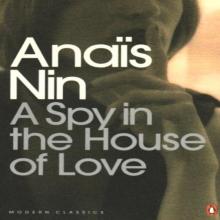 A Spy in the House of Love
A Spy in the House of Love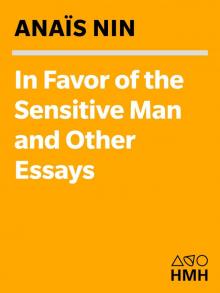 In Favor of the Sensitive Man and Other Essays (Original Harvest Book; Hb333)
In Favor of the Sensitive Man and Other Essays (Original Harvest Book; Hb333)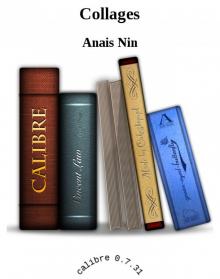 Collages
Collages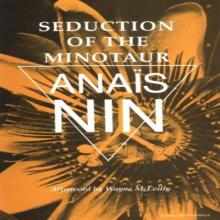 Seduction of the Minotaur
Seduction of the Minotaur Children of the Albatross
Children of the Albatross Delta of Venus
Delta of Venus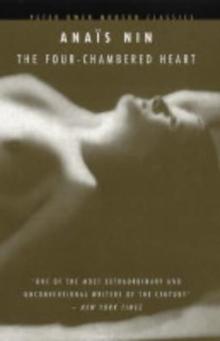 The Four-Chambered Heart coti-3
The Four-Chambered Heart coti-3 Diary of Anais Nin, Volume 2
Diary of Anais Nin, Volume 2 Diary of Anais Nin, Volume 1
Diary of Anais Nin, Volume 1 Diary of Anais Nin, Volume 4
Diary of Anais Nin, Volume 4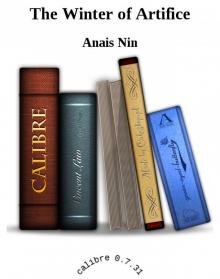 The Winter of Artifice
The Winter of Artifice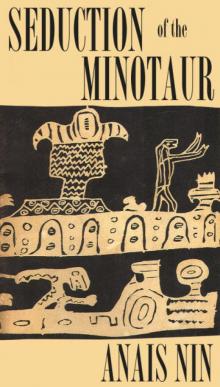 Seduction of the Minotaur coti-5
Seduction of the Minotaur coti-5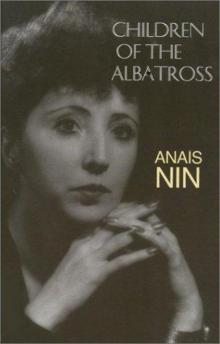 Children of the Albatross coti-2
Children of the Albatross coti-2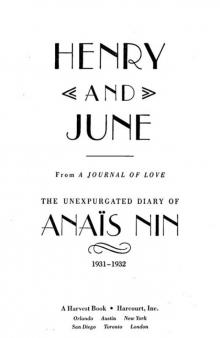 Henry and June: From A Journal of Love -The Unexpurgated Diary of Anaïs Nin (1931-1932)
Henry and June: From A Journal of Love -The Unexpurgated Diary of Anaïs Nin (1931-1932) Ladders to Fire
Ladders to Fire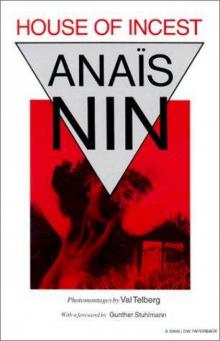 House of Incest
House of Incest